For ideal exercise recovery, consider these five top BCAA supplements: Thorne Amino Complex (dietitian-recommended), CamelBak THRIVE Recovery (superior 2:1:1 ratio), BPI Sports Best BCAA (5g matrix), Pure Encapsulations (additive-free), and any leucine-focused product. You’ll maximize benefits by timing intake 30-60 minutes pre-workout, during extended sessions, or immediately post-exercise. Budget-friendly alternatives include Nutricost BCAA Powder and NOW Sports capsules. The specific timing and formulation can dramatically enhance your performance outcomes.
Top BCAA Supplements for Rebounding Muscle Recovery
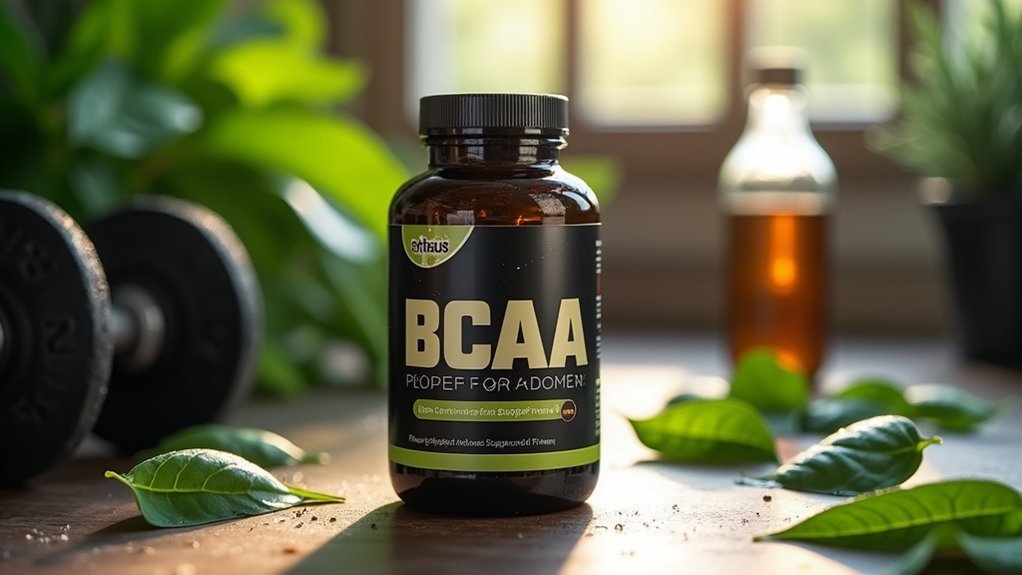
When you’re serious about maximizing post-workout recovery, the right BCAA supplement can make a significant difference. Several top-rated products stand out for their effective formulations.
Thorne Amino Complex leads the pack with its dietitian-recommended blend, while CamelBak THRIVE Recovery offers a superior 2:1:1 ratio of leucine to isoleucine and valine specifically designed for serious athletes.
If you’re looking to support both recovery and muscle growth, BPI Sports Best BCAA delivers with its 5g BCAA matrix. For those concerned about additives, Pure Encapsulations offers an unflavored BCAA powder that provides 7g of pure amino acids per scoop without any artificial ingredients.
The most effective supplements prioritize leucine content, as it’s proven to stimulate protein synthesis and limit muscle breakdown.
Many quality formulations also include glutamine for enhanced muscle restoration and immune system support during intensive training periods.
These strategic combinations help you bounce back faster between workouts.
Timing Your BCAA Intake for Trampoline Workouts
Three critical timing windows exist for maximizing BCAA benefits during trampoline workouts. Pre-workout intake 30-60 minutes before rebounding optimizes amino acid availability when you need it most, reducing fatigue while preserving muscle glycogen for high-intensity aerial movements.
Intra-workout consumption maintains endurance during longer sessions by lowering perceived exertion and preventing breakdown during high-impact phases. Post-workout supplementation within the 5-hour recovery window accelerates repair and reduces soreness after eccentric-loaded rebounding. Research suggests that taking BCAA supplements can help maintain optimal immune function after particularly strenuous trampoline exercises.
| Timing Strategy | Benefits | Ideal For | Recommended Dosage |
|---|---|---|---|
| Pre-Workout (30-60 min) | Prevent catabolism, enhance focus | Fasted morning sessions | 5-10g |
| Intra-Workout | Extend endurance, reduce fatigue | Sessions >45 minutes | 5-7g |
| Post-Workout | Accelerate recovery, reduce DOMS | High-impact routines | 5-10g |
| Divided Dosing | Maintain stable amino levels | Multiple daily workouts | 15-20g total daily |
Budget-Friendly BCAA Options for Rebounding Athletes
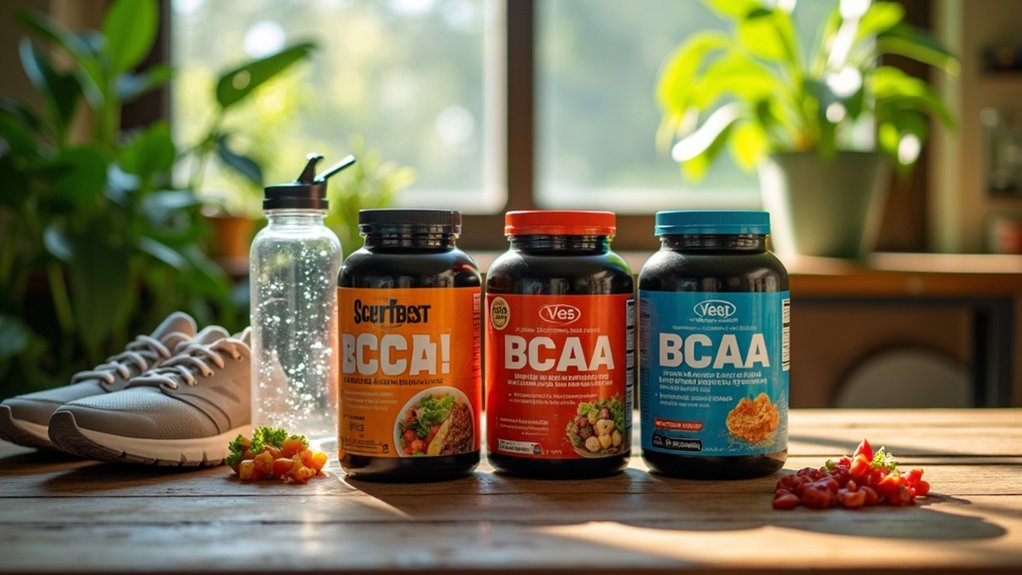
Finding affordable BCAA supplements doesn’t mean compromising on quality or effectiveness for your trampoline workouts. Nutricost BCAA Powder consistently ranks as a top budget choice, offering generous servings with the essential 2:1:1 ratio of leucine, isoleucine, and valine.
Quality meets affordability in trampoline training with Nutricost BCAA Powder’s optimal 2:1:1 amino acid ratio.
For under $25, consider NOW Sports Branched Chain Amino Acids Capsules if you prefer pills over powders. BPI Sports BCAA delivers high BCAA content at around $22, while Cellucor Alpha Aminos includes electrolytes for under $1 per serving. Naked Nutrition Naked BCAAs provides minimal additives while maintaining affordability for cost-conscious athletes.
Maximize your savings by subscribing to regular deliveries, buying in bulk, or watching for promotional offers.
When evaluating options, check for third-party certifications and BCAA content between 3,000-9,000 mg per serving to guarantee you’re getting quality recovery support at a reasonable price.
BCAA Ratio Importance for Trampoline Exercise Recovery
Understanding the ideal BCAA ratio can greatly enhance your recovery after intense trampoline workouts. The standard 2:1:1 (leucine:isoleucine:valine) ratio provides superior benefits, with leucine playing the critical role of triggering muscle protein synthesis.
For effective trampoline recovery, you’ll want to focus on:
- Using at least 5 grams of BCAAs per serving for maximum effectiveness
- Timing your intake during or immediately after your rebounding session
- Maintaining consistent supplementation alongside proper hydration
The high-impact nature of trampoline exercises creates significant muscle stress, making proper BCAA ratios particularly important. It’s especially beneficial to consume your BCAA supplement 30 minutes before your trampoline workout to maximize performance benefits and reduce exercise-induced fatigue.
While leucine dominates the formula for good reason, don’t underestimate the value of isoleucine and valine—they support immune function and energy metabolism, completing the recovery puzzle when you’re bouncing back from intense sessions.
Specialized BCAA Formulations for High-Impact Rebounding Sessions
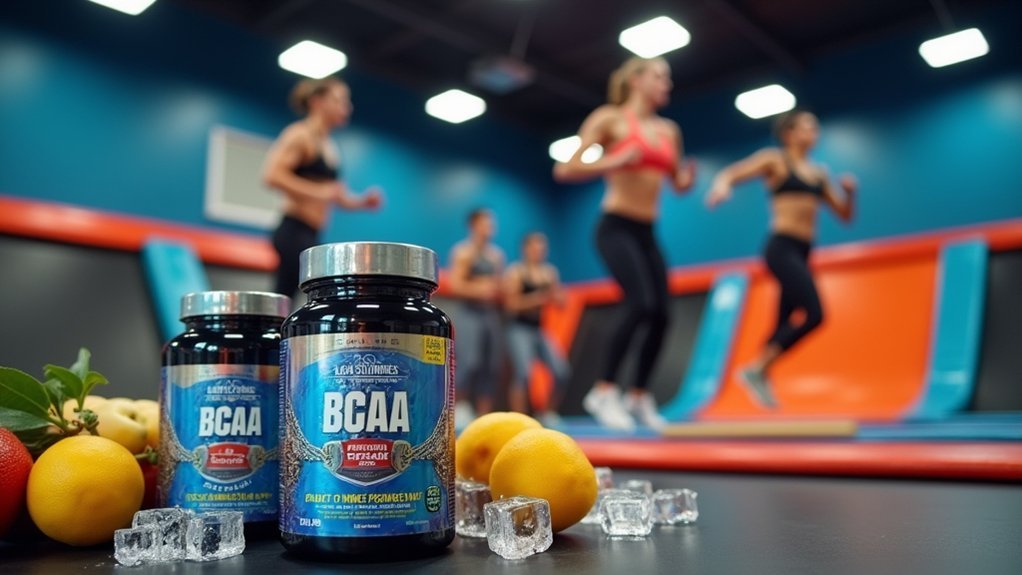
Specialized BCAA formulations offer targeted benefits beyond standard supplements when recovering from high-impact rebounding workouts. These formulations typically contain higher leucine concentrations (12g daily) to activate mTOR pathways, boosting sprint peak power by up to 19% while enhancing average power relative to body mass by 4%.
You’ll notice improved neurotransmitter modulation during intense rebounding sessions, as BCAAs compete with tryptophan uptake, reducing central fatigue and maintaining mental focus. Research shows that maintaining adequate BCAA blood levels can significantly decrease exercise-induced fatigue during prolonged workouts.
The most effective formulations include electrolytes that synergize with BCAAs to accelerate glycogen resynthesis and rehydration.
For high-frequency rebounding, look for products containing glutamine precursors that support immune cell regeneration, lowering infection risk during overreaching phases.
These specialized formulations preserve lean mass during fasting periods while enhancing GLUT4 translocation for peak recovery between sessions.
Frequently Asked Questions
Can BCAAS Cause Side Effects When Taken Regularly?
Yes, regular BCAA use can cause side effects including nausea, decreased appetite, insulin resistance, and possible liver stress. You’re at higher risk if you have kidney, liver disorders, diabetes, or other pre-existing conditions.
How Do BCAAS Interact With Other Recovery Supplements?
BCAAs often work synergistically with glutamine and creatine to enhance your muscle recovery. You’ll find they’re frequently combined with electrolytes in recovery products. Watch for potential interactions if you’re taking multiple supplements simultaneously.
Are BCAA Supplements Necessary for Casual Fitness Enthusiasts?
If you eat a balanced diet with adequate protein, you don’t necessarily need BCAA supplements. They’re more beneficial for intense training or when you’re limiting calories while trying to preserve muscle mass.
Do BCAA Needs Differ Between Cardio and Strength-Focused Workouts?
Yes, your BCAA needs do differ between workout types. For cardio, focus on intra-workout dosing (5g) to prevent muscle breakdown. For strength training, split doses pre/post-workout to support recovery and protein synthesis.
Can BCAAS Be Effectively Absorbed From Whole Food Sources?
Yes, you’ll efficiently absorb BCAAs from whole foods like meat, eggs, dairy, and legumes. These sources provide balanced amino acid profiles and often offer better overall nutrition than isolated supplements for muscle protein synthesis.
In Summary
You’ll find that the right BCAA supplement can dramatically improve your rebounding recovery. Whether you’re timing your intake around trampoline sessions, searching for budget options, or focusing on ideal ratios, these five supplements deliver results. Don’t wait until fatigue sets in—incorporate BCAAs into your routine now. Your muscles will thank you after those high-impact rebounding workouts with faster recovery and better performance.
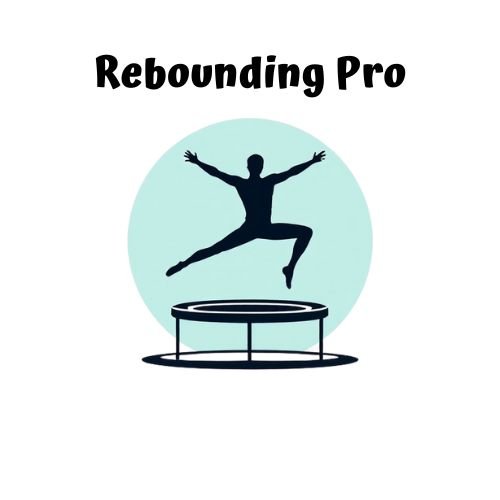
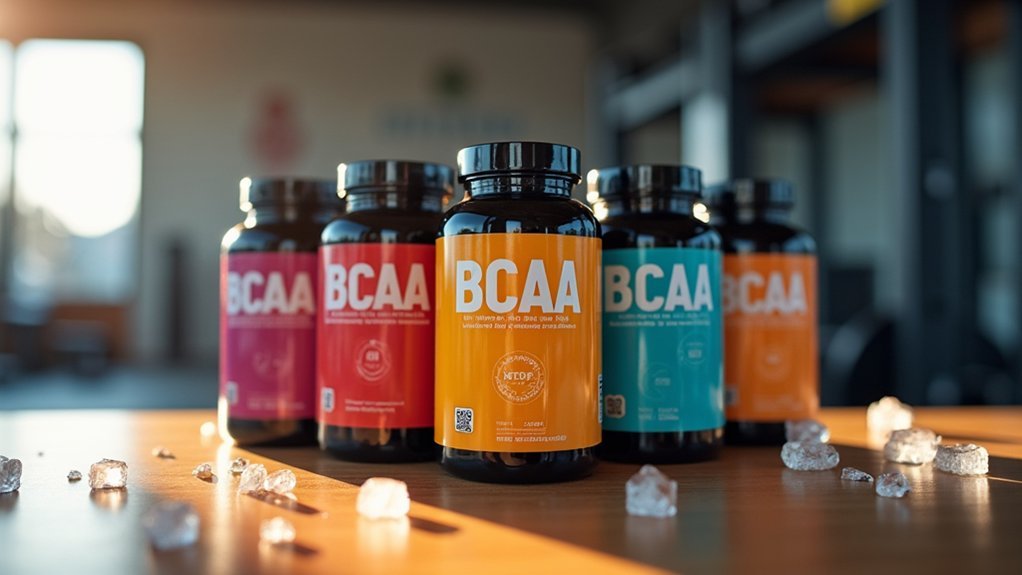



Leave a Reply